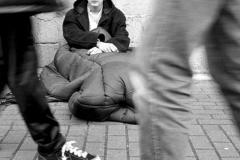
A steep rise in the number of rough sleepers is expected once evictions start again later this month.
The council wants to make sure every homeless person housed during the pandemic is offered a secure home.
But new rough sleepers are hitting the streets as quickly as the council can move those now in hostels into longer term homes.
According to a new report, an estimated ten people currently start sleeping rough in the city each week.
This is expected to rise to 15 a week once evictions restart after a temporary freeze.
And the council estimates it will have a shortfall of 71 longer-term homes by the end of the financial year.
Currently, the council has 223 people in its covid-19 short-term accommodation. It has 291 units of housing available until the end of December.
A report due to go before next Wednesday’s Housing Committee said as of 23 August, 98 people have moved on to supported housing, ten are now in private rented accommodation, 23 were reconnected with their home area and a further eight reconciled with family and friends.
The report said: “We have managed to maintain numbers by moving on enough people to offset the new people becoming homeless.
“Move on work takes time, and we will be unable to meet everyone’s accommodation needs using existing resources.”
During the last six months, the authority has experienced increasing demand for support, which it expects will get worse when furlough ends and economic hardship hits more people who have lost work during the lockdown period.
There are currently ten new rough sleepers arriving on the streets each week.
These figures are likely to increase to 15 when evictions start again.
The report said more first-time rough sleepers are moving onto the streets, rather than people with multiple compound needs.
It said: “We are working with private rented landlords to enable more provision for people who have low to medium needs but who could manage a tenancy with some support.
“Our plans include comprehensive support to enable tenancies to be set up robustly and to proceed, so they are sustainable in the longer term.”
Meanwhile, Brighton and Hove will benefit from being part of a research project, Moving On, which is studying how councils are helping rough sleepers housed during lockdown.
Centre for Homelessness Impact and Cardiff University have been given £660,000 funding from the Economic and Social Research Council for the Moving On project, which will follow individuals for a year, looking at their housing stability, health and wellbeing.
Housing Committee joint chair, Green councillor David Gibson, said: “We believe that there isn’t a single intervention that can tackle homelessness and rough sleeping, there needs to be a citywide partnership approach in the context of the national approach.
“As we finalise our 2020-2025 homelessness strategy, it is imperative that we have the evidence of what works at the centre of our plans.
“By participating in this study, we aim to ensure all of the people who have been in temporary accommodation during the pandemic, are allocated a safe, secure home, and if needed, an appropriate level of support to create a good quality of life, and that what we learn from this experience can improve our homelessness services across the board.”
The Housing Committee’s virtual meeting is due to start at 4pm on Wednesday 16 September and is broadcast on the council website.







